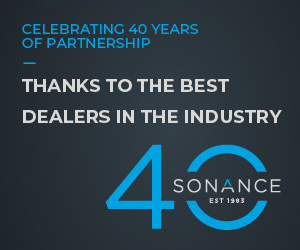GUEST POST
 Manufacturers in the CE industry have bantered this question about since the industry began. Should we establish factory direct sales teams or use independent sale representatives? Or maybe a hybrid of both? Varied levels of success and failure with any of these models riddle the history of our business. What works for one vendor may not work for another. Get 10 vendors and 10 dealers in a room and you’ll get 30 answers as to the most effective sales strategy, many of which would be valid. Which is one reason why the debate continues as to which selling strategy is best.
Manufacturers in the CE industry have bantered this question about since the industry began. Should we establish factory direct sales teams or use independent sale representatives? Or maybe a hybrid of both? Varied levels of success and failure with any of these models riddle the history of our business. What works for one vendor may not work for another. Get 10 vendors and 10 dealers in a room and you’ll get 30 answers as to the most effective sales strategy, many of which would be valid. Which is one reason why the debate continues as to which selling strategy is best.
Let’s break down the many issues surrounding sales force strategy…
This article will focus on those in our industry who’s primary selling channel is the custom installer/retailer…the dealers involved and the independent representatives that service this channel. This subject is complex with as many issues as there are vendors, dealers and representatives. I will review the key issues, as I see them, then offer solutions for everyone involved…you can kill me later.
This issue is even more volatile today than it’s been for at least the last 40 years. Consider these points:
- Decades ago, retailers of all shapes and sizes and mail order companies were the main places to purchase audio, televisions and video recorders. The overall CE market was “target rich” with consumers who wanted to buy. Today, we still have a target rich environment for CE – but CI (custom installation) plays differently as it’s a labor-based business model where CE brands/products are cash-and-carry.
- During the 60’s, 70’s and early 80’s, depending on the product category, most manufacturers used independent sales representatives to introduce new brands with new products to the last three feet of the sale, (The last three feet for a manufacturer is the point at which they sell to the dealers).
- Manufacturers provided their sales teams with the brand story, (brand and product value propositions), sales collateral, sales leads along with sales training which was predominantly delivered to the dealer network through the independent representatives. The legitimate selling channels were clearly defined, consumer advertising was plentiful and audio enthusiasts along with their videophile bretheren, were itching for the latest and greatest technology.
- Independent representatives were the lifeblood of bringing many new brands, new products and technologies to the thousands of retail stores across America. While being more economical, a network of qualified representatives, given the right sales tools, could ramp up sales more quickly and efficiently than a direct team as they had “more feet on the street”. Also it was not financially practical for a new brand to have a factory direct team calling on 5,000 different stores across the U.S. This holds true even today.
- As the specialty consumer electronics business shifted into the custom installation model, most manufacturers began to understand that whatever brand and product the CI dealer’s recommended to their clients were the brands and products that were sold and installed. So most vendors became focused on convincing the dealer to recommend their brand. They relied on the dealer to present the brand’s value instead of the brand’s marketing efforts to do that. Independent representatives became extremely important to many of the new emerging brands in order to get their brand story to the dealer base so the dealer would specify that brand. And as the industry was on a steady upward growth, and since “a high tide raises all boats”…this narrow approach to their selling strategy worked to achieve their sales goals. Everything was hunky-dory in the world of custom installation…
- As with any “new” industry, the CI segment grew up, new brands and new technologies became plentiful. Achieving growth goals became more difficult in a crowded, commoditized market. Yet, manufacturers continued to expect the sales team to convince dealers to recommend their products, without any consumer advertising, and with old, non-relevant products. But now dealers had other brand choices and moved on to those brands that were more relevant, more trustworthy, presenting a stronger value proposition delivering new consumers to their door. Amazingly, the failing companies typically blamed their sales teams for lack of effort…which of course included the independent representatives.
Never Assume Anything
- Today, many manufacturers continue to rely on dealers to recommend their products – as evidence to this, many manufacturers continue to advertise in trade magazines only. Or they’ve stopped marketing and advertising all together, assuming that dealers and sales teams will continue to recommend their out-of-date, non-relevant products to their customers. I know, that’s harsh of me to say, but it’s true and most importantly, it’s the wrong assumption.
- Pressure mounts for sales teams, (direct or independent), to do what the brand is not doing, ergo; differentiate their brand by showing the relevant, unique benefits of the brand and their products. So they improvise, invent, make shit up for the dealer to use in THEIR sales presentation to their clients.
- Buying groups have also matured to the point where they are not looking to just add more brands, but they are in search for profitable brands that bring new customers to their dealer members. So if, by chance, the group buys the brand, the manufacturer now has to figure out how to pay for deeper discounts,(buying groups require this as part of their criteria for the group to take interest in the brand). Typically, the manufacturer offsets that deeper group discount by reducing sales commissions, or making the dealers in the group “House Accounts” with no commission at all. It’s not unusual for the dealer to experience a drop in service quality and frequency as the factory isn’t prepared to support the dealer at the same service level as their local representative had provided. they use the same tools that the independent sales team had been using with the dealer prior to the buying group. This can lead to failure because when dealers see a change like this, they expect more from the vendor. Most vendors do not provide refreshed, relevant sales and marketing tools to effectively call on the group dealer members. So it appears the change was not very effective.
- Unfortunately, products that are on people’s list of must haves, are not what many specialty suppliers in the CI channel are making today. Research presented at the 2015 Pro Group meeting, the dealer members report that the hot product categories today are: 4k, Hi-Resolution Audio, wireless audio, networking, Bluetooth, headphones, turntables, and tablets. The popularity of mobile access to audio/video content has radically changed how people consume media forever – quickly and dramatically changing long-standing product categories such as those categories that make up Home Theater systems. The Millennials own three devices that are connected to the internet all the time using their smartphone, tablet and laptop. And they use all three at the same time all day and into the night! Do you think they’re interested in home theaters, or hard-wired, high-end audio systems? THAT consumer represents a small market segment.
- Vendors and their sales teams, who are not aware of these trends and continue to make products of little consumer interest, need to re-think what they do for a living and why they are in business. CNBC recently reported that within 5 years, streaming technology will be ubiquitous, finally filling the consumer “want” to get whatever content they want, whenever they want, wherever they want it and on the device they choose to access it. Reed Hastings the founder of Netflix stated that in 10 years, we will have 10 gigs wireless bandwidth over the Internet. Hardly a market for most hardware manufacturers and re-sellers of Blu-ray players, home theater components…except the wireless kind…maybe.
I Can See Russia from My Bedroom
It’s easy to see…specialty hardware manufacturers that continue to make what they already sell, will always find a market for their goods, but this wealthy target rich consumer segment will continue to shrink for those vendors who choose to stay their course, too stubborn or ignorant to connect with this new consumer.
Independent representatives also need to improve their own value proposition so that these new emerging manufacturers will hire them to build a sustainable business as their local market evolves with the rest of the world.
Unchanged, this situation will leave these vendors and representatives to decide if they want to remain a small brand, taking what tiny segment of a shrinking market they can get and loving life as it is, or not.
He Said, She Said
Conducting the research for this article I spoke with several of our industry’s leading successful dealers, reps and manufacturers, and for the most part, their condition remains status quo with dealers and reps.
It is true that in the past 15 years or so, several manufacturers have taken their brand direct. B&W, NAD, PSB, come to mind while others have taken a hybrid approach such as Core Brands – Direct in the Western U.S. with independent representatives in the rest of the country – while others have gone to an independent representative model – Sony CI is the latest major brand to do so. In speaking with Frank Sterns, V.P. of Sony’s Custom Install Channel, he reflected on the value of independent representatives by saying, he and many of his peers believe that 40% of their rep force is doing a good-to-great job, 40% need improvement and 20% should be replaced, (but there are no clear alternatives in those markets). Some representatives come across as order takers. Others tell the dealer to contact the factory for help. And others lead the charge, doing whatever is needed to help the dealer and fairly representing the factory. They take ownership of the results.
Some reps, (who asked to remain anonymous), complain about dealers and manufacturers who seem unresponsive or engage in actions that are counterproductive to their efforts to grow the business in their territory. As an example, it is common for manufacturers who are trying to cut operating costs, to shift more administrative responsibilities to the rep, (increasing the rep cost of doing business), while the factory reduces commissions and raises quotas. Factory sales managers, (again, who do not want their names publicized here), complain that reps are lazy, don’t know their product or service and don’t invest enough time to that manufacturer to develop the market. That’s when dealers tell manufacturers that their rep is worthless and that the brand should fire the rep firm and give the dealer what is equivalent to the rep commission. Which will not solve the issue of bad service. Marty Hayse, V.P. at Dennis Sage Home Entertainment, the single largest CI dealer in Arizona, said that hardly anyone calls on him anymore, reps or factory direct folks. Marty, have you brushed your teeth recently?
The dealer, the manufacturer, the representative – all seem to be in this, he-said-she-said mode of blame…..which does nothing to solve these issues.
Dealers are Slipping, Slipping, Slipping into the Darkness
Ok, are CE dealers perfect marketing, sales and installation businesses? Are they financially secure? Do they hire qualified people? Are they open to new ideas about how to run their business? Are they market leaders? Are they honest? Based on my own dealer experiences at Integra, Sonance, Sunfire, Infinity and others, the answer is clearly, not so much. However there are smart, honest, hardworking dealers that are market leaders and deserve recognition. It’s the nature of any business to have both.
Dealers who are poorly run create debt that they cannot ever pay back, hire unqualified installers and sales people which result in promises they can’t keep. They create bad system designs and poor installations which in turn creates a bad reputation about CI dealers in particular. Even some dealers in buying groups don’t abide by the group requirements such as making themselves available when a rep for a brand in the group wants to set an appointment.
It’s the Rep’s Fault
Representatives are commonly used to blame for poor sales. Dealers and manufacturers alike blame reps who take on too many lines, (for all the right reasons). Reps lie, they present things as facts when they aren’t substantiated. They make promises they can’t keep or they offer poor follow-up. Reps can be emotional, hard to manage and some of them just don’t know much about what they do for a living. As a consequence, they get no respect from the dealers, no trust. They go where the money is and ignore the other brands in their “bag”. As a consequence some rep firms deliver little or no value to either the dealer or the manufacturer. That’s when dealers tell factories to give THEM the rep commission. That’s when factories decide to change reps, (with little to no upgrade in the results for the territory). And finally, this is when factories may decide to go factory direct.
Then There’s the Flip Side
The CE industry as a whole is changing more rapidly than at any other time I can remember in the past 40 years.
Some manufacturers do support their sales teams and dealers like B&W, Sonos, Bose, Samsung, Sony, James Loudspeakers, Sonance, Leon and others. You may notice that some of these brands use factory direct sales teams, or pay lower-than-typical commissions, but they ALL supply their selling channels with a brand and products that end-users want to buy. They deploy branded marketing materials, advertisements, strong social media campaigns, etc;they drive customers to dealers;these companies know who they are, why consumers should buy their brand and know what they do for a living. They focus on delivering relevant value propositions for their brand and their products. Their inside teams are readily accessible, understand the challenges that they face in the field including at the last three feet of the sale – (both to the dealer and the end-user).
These are the brands, sales teams and dealers that make this business fun, rewarding and profitable…
The Three Musketeers
What’s clear, (to me anyway), is that all three elements of a relationship in this business, the vendor, the rep, and dealer, all need to be on the same page. There are clear ways to create this symbiotic relationship that lasts through the test of time – and to me, this is not rocket science…
- Manufacturers need to accept the responsibility to create a solid relevant brand value proposition to end-users before any sales success can occur. They need to clearly and concisely define who they are and what they do for a living. Then focus all their energy in implementing these definitions throughout their organization. You can clearly tell which companies have done this. Look at Sonos – A single brand proposition with 5-6 products approaching $1 billion in revenue. If a rep fails, (independent or direct), then the manufacturer should feel THEY are responsible for the failure, along with the rep. Why? Because if the manufacturers don’t know what they do for a living, how can the factory hold anyone else accountable for the results if the factory itself has an identity crisis? It’s not the reps responsibility to make up the value proposition, nor is it the dealer’s.
- Sales representatives, factory direct or independent, need to have their operations structured for today’s market, meeting the needs of today’s manufacturers, dealers and THEIR end-users. They need to be technically proficient about the technologies they are selling, but realize it’s not the technology that sells anything anymore. (In good volume). They need to be conversant in their market, develop real trust with every dealer and their teams. They need to offer all the things that dealers value and manufacturers cannot easily execute, (but support), like training, education, thoughtful distribution strategies, etc. High Tech Marketing in the Southeast is just one example of a winning Independent Representative company.
- Dealers need to return to the basics of business. Just because most of them in the CE world are now in the installation business, does not mean that all of their customers will simply take their brand and product recommendations as presented and write a check. Today is different, as it will be tomorrow. Do they have a business plan? Paull Starkey at Vital Management asks, “Are they conversant in the disciplines of business required to build a sustainable company that offers value to their employees, their customers, their vendors?” Do they offer demonstrations to their target clients which powerfully differentiate their value over any competitor on the Internet or any other CI dealer or brick and mortar retailer?
There are legitimate reasons why factories use independent reps or change to using factory direct structures.
Independent Representatives
- Newly established specialized brands who need a low cost of entry to put feet on the street to build their sales channel. Reps offer a variable expense model instead of fixed overhead when using factory direct personnel.
- Local market knowledge – Paul Starkey pointed out that good rep firms have strong relationships with their dealers. They can be advocates for those dealers to the manufacturer and vice-a-versa. This presents a faster way to build sales as many dealers still buy what their favorite rep sells while many factory people have little knowledge of those dealers.
- They provide the factory with a wider range of dealers in order to choose the appropriate mix of accounts for their brand, maximizing sales potential in the market.
- Manufacturers that have relatively simple technology to sell. independent reps are effective at that.
- A niche product category is likely to be more successful early in the launch as the category doesn’t compete within the rep’s brand/product mix.
- Representatives offer several different brands of products in a wide range of product categories. The CI industry almost requires that approach to be valuable to their dealers. Vendors can positively exploit that because the rep can more easily secure a meeting with their dealers to whom they sell multiple brands to. Factory direct teams with a single brand in their bag may have difficulty securing one meeting with the dealer because there is less perceived value by the dealer.
Factory Direct Sales Team
- One belief shared by many vendors like Frank Sterns at Sony, When the brand grows to around $200 million in revenue, with 600-700 dealers, most vendors agree it becomes financially viable to go direct.
- Highly technical products require specialized knowledge. With Independent reps, they may have 12 or more brands and little time to completely understand the technology and be able to educate each dealer on those. A direct team with one, highly technical brand to sell can become far more conversant in the technology as they have the time to focus on learning and more time to train and educate the dealer base.
- Another point Frank Sterns made – if the brand is stable, has good market share, is lower maintenance, it makes sense to hire a factory team and avoid paying commission which can run into millions.
The Consensus from Vendors, Dealers and Reps
- Factories own their brand – they should act like it by providing the necessary marketing and selling tools for anyone to go out and sell their brand and products.
- Most factories in the CI channel are ignorant in what they’re doing with sales. Key Point: When factories hire reps, many think that’s all they need to do to create success.
- Many factories that pay small commissions to the reps, get what they pay for.
- Years ago, dealers relied on reps to introduce their staff to new brands, new technologies as well as new information on the brands they already buy. Today, the factories communicate directly to dealers through the internet as well as offering dealer portals to conduct business with that factory. In some cases, this weakens the reps position with the dealer.
- Many manufacturers are ignorant of what they are responsible for in the relationship. And those that know, don’t seem to have the resources to create these things:
o Who is responsible for creating the following:
– Education and training – the factory
– Branding, marketing communications – the factory
– Sales value proposition and management – the factory
– Creation of the product value proposition – the factory
o Who is responsible for implementing the information that the factory produces?
– The Sales Team – The management and the field sales force – be it factory direct or independent representatives – All need to take ownership, communicate regularly amongst themselves and each other.
Can we all just get along?
Everyone in this sales chain should have a “manifesto” of their own such as the one the buying group, Azione has. They offer one for their dealer members and one for the manufacturer members. BTW, these were created by the Azione dealer members and the manufacturer members, lead by Richard Glikes, the founder and President of Azione.
Dealers and manufacturers that are not members of Azione or other groups, should have a list of “must do’s” for all of the selling and buying parties involved. When ALL parties follow these guidelines, it creates respect, builds trust and creates long term relationships with suppliers, reps and the dealers’ own internal teams. A relationship without trust is a difficult relationship at best. And it usually ends in frustration and termination of that relationship.
Building trust in this business, (in any business these days), means that when good times are good, they’re really good, and when bad times present themselves, people who trust each other work through the challenges together and come out the other side stronger, healthier and with a new respect for each other. And I believe that trust contributes to success more than any other element of a relationship. Yes, great product is necessary. Trust is earned over time but can be lost in a second, which is why it is so valuable. When we all focus on building trust through consistent honest action and doing what we say we will do, our business can withstand any challenge that’s bound to come along.
GUEST POST – MARK WEISENBERG
This post was written by Mark Weisenberg, a well-known denizen of the tech community.
Mark has successfully served in executive sales and marketing positions at companies such as Infinity Systems, Luxman Audio, Sonance, SpeakerCraft, Integra and Sunfire. He has served on CEA Audio boards, was a founding member of the Home Audio Alliance, (Now the MRAV Council – CEA). He also authored a lecture series, “Selling Luxury, Do it or Die” to ELAN and Sunfire dealers worldwide.
Mark can be reached at – Email: awalan2b@yahoo.com or Phone: (909) 816-6661.






Leave a Reply